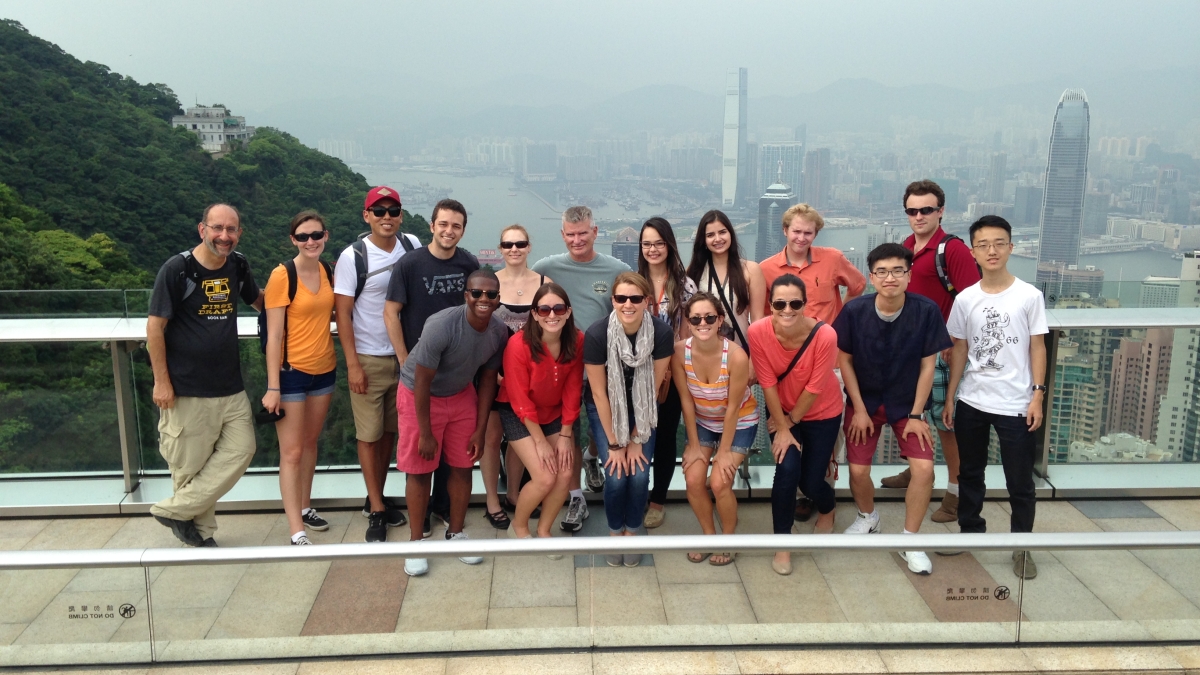ASU students join Hong Kong counterparts to analyze urban sustainability

Compared to the 1.5 million people living in the roughly 500 square miles that make up Phoenix, Hong Kong fits over 7 million people in less than 430 square miles. What’s more, half of Hong Kong residents live above the 15th floor.
That density is what initially drew and later challenged Arizona State University School of Sustainability students who studied urban sustainability policy this summer as part of the Global Sustainability Studies Program, one of ASU’s Rob and Melani Walton Sustainability Solutions Initiatives.
“Hong Kong was fascinating to me because of its density and the fact that it’s facing the sustainability challenges of the future right now,” said Melissa Davidson, a graduate student in the School of Sustainability’s Master’s of Sustainable Solutions. “Hong Kong-like density is going to continue to dominate our world’s major cities. Understanding the problems in a different context is going to help us as future sustainability scientists to be better equipped to deal with the problems we’re all going to face eventually.”
Behind the scenes of a city
Fifteen ASU sustainability students studied alongside Chinese students at City University of Hong Kong (City U) during an academically rigorous, jam-packed two-week course. The course was co-taught by School of Sustainability professor Rob Melnick and professor Shi Han of City U’s Department of Public Policy. Attending lectures every morning and participating in field trips in the afternoons enabled students to experience not only a different university setting, but to see the inner workings of Hong Kong.
Field trips took them to the Swire Institute of Marine Sciences, where experts discussed how to achieve balance between feeding 7 million people and conserving marine life; a coal-fired power station that showcased Hong Kong’s energy policy and usage; and one of the major landfills that stores and processes the city’s waste.
“There was a great variety of learning experiences between lectures at City U and field trips to practical, on-the-ground embodiments of what we learned in the classroom,” said Laurel Kruke, a graduate student in the School of Sustainability’s Master of Arts in Sustainability. “Sustainability is such a global issue, and we are studying research topics often on a local scale, but they are all interconnected with this global community.”
Not all solutions are equal
The students studied six key sustainability issue areas while in Hong Kong: energy; water; waste; land use and housing; transportation; and marine conservation. At the end of their two weeks, six teams of ASU and City U students publicly presented two posters each – one that analyzed a major sustainability challenge in Hong Kong, and one that presented innovative policy solutions for that challenge. Some of the policy recommendations developed by students included solutions to ease traffic congestion in Hong Kong’s Central Business District; the creation of affordable housing for Hong Kong’s post-1980s generation; and policies needed to conserve marine life while addressing traditional, local demand for seafood.
Working in cross-cultural teams equipped the ASU students with academic and life skills.
“You may find that what works in one country may not work in another,” said Joe Knott, a current doctoral student in the School of Sustainability, speaking from his experience in traveling to over 30 countries and implementing sustainability policies as a Lieutenant Colonel in the U.S. Army. “Your opinion is not always the only opinion. You may be sincere, you may have the right answer, but if you try to force your sustainability experience on someone else, you won’t achieve it.”
Sometimes, challenges provide opportunities.
“For instance, Hong Kong’s transportation system is phenomenal because it can move a lot of people at one time,” said Davidson. “On the flip side, you also have 7 million people using resources on a small amount of land. It’s really about working with what you have and how to best continue economic growth without sacrificing social equity and environmental stability.”
Culture provides context
Now back in Arizona, the students are applying what they’ve learned in their studies, thankful for the knowledge and experience the trip to Hong Kong provided.
“Now I know how to look at climate change in a global perspective, and also how it relates to a specific region,” said Kruke. “I grew as a person by getting out of my comfort zone, which was an unparalleled experience.”
And while many study abroad programs spend little time in the classroom, learning at City U alongside Chinese students required both academic work in a classroom setting and on the front lines of sustainability. Both learning experiences immersed ASU students in another culture.
“Hong Kong allowed me to understand how much context matters in sustainability issues,” said Davidson. “I learned so much from the City U students about how to communicate and understand different perspectives.”
The trip showed that one person cannot solve any sustainability issue; you need a team.
“It’s nice to read and study because things are easily seen in slides, books or on a website, but you have to get ‘boots to the ground’ – what we like to say in the Army – to address sustainability issues for a city, region or location with multiple and diverse stakeholders,” said Knott.
The students will share their research on urban sustainability in Hong Kong with the public during a Sustainability Series presented by the Julie Ann Wrigley Global Institute of Sustainability at 11:30 a.m., Sept. 11.